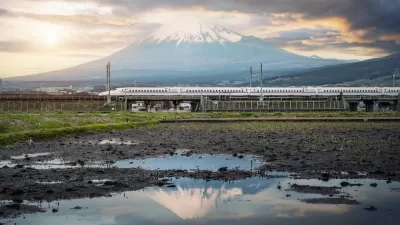Japanese officials recently approved plans to build a 320-mile magnetic levitation train system. The $114 billion project is expected to begin construction in 2014.
Speeds are expected to exceed 300 mph, and will cut the trip between Osaka and Tokyo to one hour.
"Of course, all of these selling points come with a hefty price tag that's hard to swallow for most countries. Japan's project is currently estimated to cost $114 billion with construction to start in 2014 and last until 2045. Such an incredible budget and long timeline is mostly due to the decision to make the route as straight as possible, sending it under mountains and requiring massive tunnels. In fact, 60 percent of the line will exist underground at an average depth of 130 feet.
While Japan has committed to maglev as the future of its rail system, similar projects throughout the United States are still struggling to get off the ground. Only one high-speed corridor exists in the United States, bridging the 456 miles between Boston and Washington, D.C.. With an average cruising speed of just 70 mph, travel time clocks in right around seven hours.
Efforts by the U.S. government to fund the development of new and faster infrastructure have either been demonized by opponents as wasteful spending or been criticized for not going far enough. "
FULL STORY: Big in Japan: High-Speed Magnetic Levitation Trains

Planetizen Federal Action Tracker
A weekly monitor of how Trump’s orders and actions are impacting planners and planning in America.

Chicago’s Ghost Rails
Just beneath the surface of the modern city lie the remnants of its expansive early 20th-century streetcar system.

San Antonio and Austin are Fusing Into one Massive Megaregion
The region spanning the two central Texas cities is growing fast, posing challenges for local infrastructure and water supplies.

Since Zion's Shuttles Went Electric “The Smog is Gone”
Visitors to Zion National Park can enjoy the canyon via the nation’s first fully electric park shuttle system.

Trump Distributing DOT Safety Funds at 1/10 Rate of Biden
Funds for Safe Streets and other transportation safety and equity programs are being held up by administrative reviews and conflicts with the Trump administration’s priorities.

German Cities Subsidize Taxis for Women Amid Wave of Violence
Free or low-cost taxi rides can help women navigate cities more safely, but critics say the programs don't address the root causes of violence against women.
Urban Design for Planners 1: Software Tools
This six-course series explores essential urban design concepts using open source software and equips planners with the tools they need to participate fully in the urban design process.
Planning for Universal Design
Learn the tools for implementing Universal Design in planning regulations.
planning NEXT
Appalachian Highlands Housing Partners
Mpact (founded as Rail~Volution)
City of Camden Redevelopment Agency
City of Astoria
City of Portland
City of Laramie



























